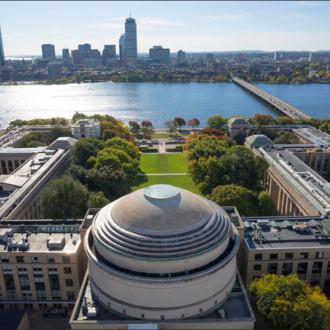MIT Sloan Fellows MBA Program
Leadership
Lessons From The Second Law Of Thermodynamics
By
In the realm of crisis management, few leaders have as venerable a reputation as Thad Allen, SF ’89. Former Commandant of the United States Coast Guard, Allen has been summoned by the country’s leaders to tackle the most formidable challenges of their presidencies. Former President George W. Bush called on Allen to reboot the disastrous Hurricane Katrina recovery effort, and when the Deep Water Horizon oil spill defied containment, former President Barack Obama asked Allen to take the helm. In each case, he turned around the situation with stunning alacrity.
Today, as Senior Executive Advisor at Booz Allen Hamilton, Thad Allen’s legendary wisdom is still very much in demand. And it stands to reason he has definite ideas about the core requirements of leadership in the throes of a global pandemic. “It all boils down to the second law of thermodynamics,” he says. “The world is becoming more and more complex, more chaotic, more ambiguous. Globalization—on both a micro and macro level—is driving this. So is climate change, which is launching an increasing number of weather-related catastrophes—and, of course, technology, especially social media.”
But Allen makes it clear that we must run toward these challenges, embrace them, understand them, not put our heads down and wish for things to normalize. “Status quo is an oxymoron,” he says. “Every microsecond on earth, we are in a different world.” Catastrophes like hurricanes, nuclear fall-out, and pandemics don’t respect borders, he adds. “Oceans don’t know which coastline belongs to which country. Ebola and COVID-19 don’t stop at the border and wait for a visa. The world has evolved. Yes, globalization has opened up transmission paths for pandemics, but we’ve seen many benefits from globalization as well. When you look at an international crisis and try to solve it with a political point of view, you will inevitably get the wrong answer.”
Technology has advanced beyond us
Technology, Allen says, is also global, spilling across continents and time zones without heed of national boundaries—and it is expanding more rapidly than the legal frameworks and international laws that must govern it. “The sophistication of technology is accelerating and, with it, our inability as a society to adjust to it. Our governments, law enforcement agencies, and other legal entities are falling further and further behind while the consequences of that inadequacy become more critical.”
We’re a digital society, Allen adds, “but we don’t know how to be good digital citizens. It’s like when humans discovered fire and were burned by it. The internet has become an ungoverned jungle. The fact is, however, that you can’t remove yourself from the digital environment. That ship has sailed. We’ve democratized data, but it’s a power we don’t yet know how to manage.”
Not surprising, Allen is somewhat obsessed with “black swans”: rare, unpredictable events with severe consequences that were obvious in hindsight. “We need to increase our understanding of how to perceive and adapt to complex situations. Novel events like this pandemic will continually challenge us and our legal and political frameworks, many of which are no longer relevant in the 21st-century.”
He notes that smart decisions are based on the best available science, but the intrusion of politics means that scientific solutions have become proprietary. Sharing knowledge—or even vaccines—across borders is becoming a greater and greater challenge. “When we mix politics and crisis management,” Allen warns, “we fail at both.”
One of the lessons humanity needs to learn, Allen believes, is about collaboration. “What is the answer to turbulence? Quite simply: coproduction. No single person can solve the complex problems challenging the world today. It has become a matter of working together to create frameworks and coproduce outcomes. That’s the overarching paradigm in all the efforts I’ve been involved with. Figure out a value proposition, bring it to bear, and unify the efforts. The best crisis management is the product of team effort.”



